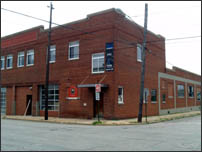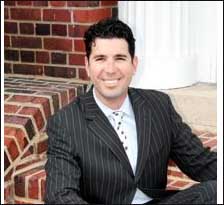 An embattled rehabilitation project started by developer Justin French is getting even more litigious.
An embattled rehabilitation project started by developer Justin French is getting even more litigious.
Essex Bank and Lynchburg-based Select Bank have jumped into the fray with lawsuits against the Bank of Hampton Roads. The two banks are looking to recover $5 million they contributed to loans that went bad after French defaulted.
The banks claim that the Bank of Hampton Roads, which was the lead lender on the properties, failed in its duty to properly service the loans by allowing the developer to draw a percentage of the total credit line greater than the percentage of work that was performed on the properties. Now Essex and Select want their money back, plus damages.
According to the suits, Essex Bank and Select Bank contributed $2 million and $1 million, respectively, to the loan on the Norfolk Street property, an amount equal to almost a third of the principal loan balance. Essex Bank contributed $2 million to the Summit Avenue property, an amount equal to 20 percent of the principal balance.
Combined, the two banks seek a judgment of more than $11 million against the Bank of Hampton Roads.
T he new suits are the latest to be filed that center on the properties at 3031 Norfolk St. and 1700 Summit Ave. in the Scott’s Addition neighborhood of Richmond. The planned apartment conversion projects started to unravel after French defaulted on construction loans for the two projects totaling more than $15 million. Bank of Richmond originated the loans, and following a series of mergers they came to be held by the Bank of Hampton Roads.
he new suits are the latest to be filed that center on the properties at 3031 Norfolk St. and 1700 Summit Ave. in the Scott’s Addition neighborhood of Richmond. The planned apartment conversion projects started to unravel after French defaulted on construction loans for the two projects totaling more than $15 million. Bank of Richmond originated the loans, and following a series of mergers they came to be held by the Bank of Hampton Roads.
Following news that French was in default, laborers, including general contractor City & Guilds, filed hundreds of thousands of dollars worth of mechanics’ liens.
Then, with nearly all the loan funds disbursed, the Bank of Hampton Roads discovered that the Norfolk Street project was only half-finished and that work on the Summit Avenue property had hardly begun. The bank filed suit against the project’s architect, Todd Dykshorn, seeking $15 million, for negligently misrepresenting the progress of the work being completed. The bank had hired Dykshorn to sign off on draw requests by French.
Dykshorn’s attorney Jack Burtch fired back, stating that the bank’s suit had no legal basis and that the bank had told Dykshorn to keep the process moving despite concerns he had expressed about the project. That case is pending.
Last week the Bank of Hampton Roads took action on the Norfolk Street property, requesting permission from the court to appoint a receiver with the intention of finishing the project and selling the completed apartment complex. Attorney Rick Matthews of Pender & Coward said doing so would have the best chance at recovering the loan funds and preserving the historic tax credits. The bank is still deciding what action to take on the Summit Avenue property.
The latest suits faults the Bank of Hampton Roads with not properly monitoring the work being done, as well as not requiring French to secure performance bonds as it stated it would in the loan documents. Performance bonds are usually issued by an insurance company and are issued to guarantee satisfactory completion of a project by a contractor. The suits claim that the Bank of Hampton Roads intentionally misled the loan participants because they never intended to require French to secure performance bonds for the projects.
Vernon Inge, an attorney with LeClair Ryan who filed the suits on behalf of the plaintiffs, declined to comment on the cases. Rick Matthews, attorney for Bank of Hampton Roads, could not be reached by press time.
Previously on BizSense:
Bank tries to build on French’s shaky foundation
Architect strikes back against lawsuit
Architect on French projects sued
Al Harris covers commercial real estate for BizSense. Please send news tips to Al@richmondbizsense.com.
 An embattled rehabilitation project started by developer Justin French is getting even more litigious.
An embattled rehabilitation project started by developer Justin French is getting even more litigious.
Essex Bank and Lynchburg-based Select Bank have jumped into the fray with lawsuits against the Bank of Hampton Roads. The two banks are looking to recover $5 million they contributed to loans that went bad after French defaulted.
The banks claim that the Bank of Hampton Roads, which was the lead lender on the properties, failed in its duty to properly service the loans by allowing the developer to draw a percentage of the total credit line greater than the percentage of work that was performed on the properties. Now Essex and Select want their money back, plus damages.
According to the suits, Essex Bank and Select Bank contributed $2 million and $1 million, respectively, to the loan on the Norfolk Street property, an amount equal to almost a third of the principal loan balance. Essex Bank contributed $2 million to the Summit Avenue property, an amount equal to 20 percent of the principal balance.
Combined, the two banks seek a judgment of more than $11 million against the Bank of Hampton Roads.
T he new suits are the latest to be filed that center on the properties at 3031 Norfolk St. and 1700 Summit Ave. in the Scott’s Addition neighborhood of Richmond. The planned apartment conversion projects started to unravel after French defaulted on construction loans for the two projects totaling more than $15 million. Bank of Richmond originated the loans, and following a series of mergers they came to be held by the Bank of Hampton Roads.
he new suits are the latest to be filed that center on the properties at 3031 Norfolk St. and 1700 Summit Ave. in the Scott’s Addition neighborhood of Richmond. The planned apartment conversion projects started to unravel after French defaulted on construction loans for the two projects totaling more than $15 million. Bank of Richmond originated the loans, and following a series of mergers they came to be held by the Bank of Hampton Roads.
Following news that French was in default, laborers, including general contractor City & Guilds, filed hundreds of thousands of dollars worth of mechanics’ liens.
Then, with nearly all the loan funds disbursed, the Bank of Hampton Roads discovered that the Norfolk Street project was only half-finished and that work on the Summit Avenue property had hardly begun. The bank filed suit against the project’s architect, Todd Dykshorn, seeking $15 million, for negligently misrepresenting the progress of the work being completed. The bank had hired Dykshorn to sign off on draw requests by French.
Dykshorn’s attorney Jack Burtch fired back, stating that the bank’s suit had no legal basis and that the bank had told Dykshorn to keep the process moving despite concerns he had expressed about the project. That case is pending.
Last week the Bank of Hampton Roads took action on the Norfolk Street property, requesting permission from the court to appoint a receiver with the intention of finishing the project and selling the completed apartment complex. Attorney Rick Matthews of Pender & Coward said doing so would have the best chance at recovering the loan funds and preserving the historic tax credits. The bank is still deciding what action to take on the Summit Avenue property.
The latest suits faults the Bank of Hampton Roads with not properly monitoring the work being done, as well as not requiring French to secure performance bonds as it stated it would in the loan documents. Performance bonds are usually issued by an insurance company and are issued to guarantee satisfactory completion of a project by a contractor. The suits claim that the Bank of Hampton Roads intentionally misled the loan participants because they never intended to require French to secure performance bonds for the projects.
Vernon Inge, an attorney with LeClair Ryan who filed the suits on behalf of the plaintiffs, declined to comment on the cases. Rick Matthews, attorney for Bank of Hampton Roads, could not be reached by press time.
Previously on BizSense:
Bank tries to build on French’s shaky foundation
Architect strikes back against lawsuit
Architect on French projects sued
Al Harris covers commercial real estate for BizSense. Please send news tips to Al@richmondbizsense.com.



Justin French has become BizSense’s favorite topic. If your business model works and you succeed at this media, you may owe him a commission!
At least you should buy him a lunch when he gets out…